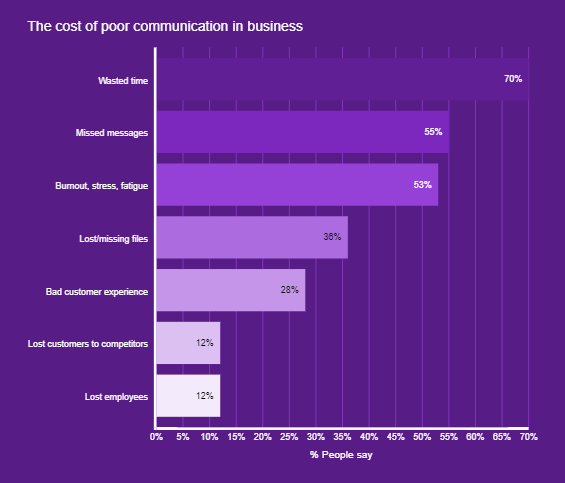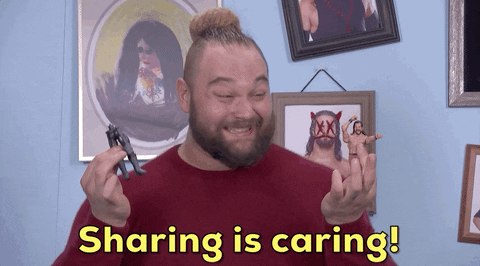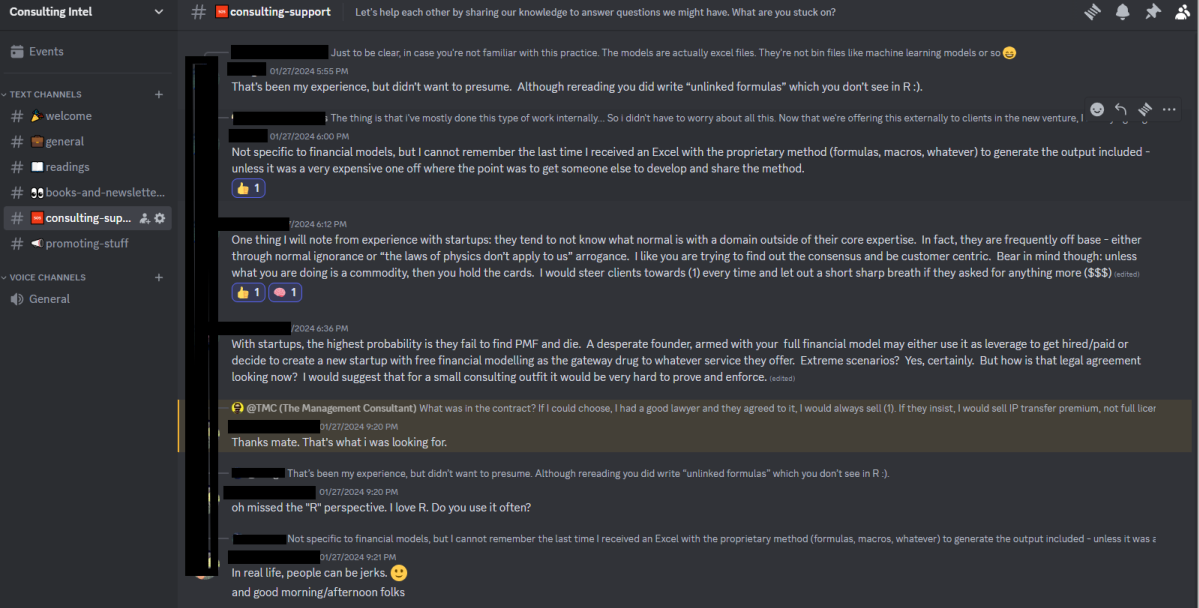
Hello to the 1,259 subscribers who read Consulting Intel! I recently switched to a different newsletter format: read the whole thing! There’s a new section in here!
Having smart ideas means jacksh*t in the world of consulting if you can’t package them right.
Seasoned consultants know that how you communicate those ideas with others makes all the difference.
We all want to sound intelligent and on point, but there’s more to corporate communication than just throwing around big words to seek validation from your peers.
The secret language
If you think about it, every industry has its own secret language, filled with special terms and shortcuts.
These shortforms and foundational terminology offer an agile base to quickly cover some big, complicated ideas.
For example, if I’m chatting with Bob who works in finance and I casually drop “EBITDA” into the conversation, I’m showing them I understand their language. I kind of think of it as a weird handshake that acknowledges: “I’m one of you”, like when you manage to gain entry at one of those underground nightclubs in Berlin.
However, just throwing terms from the glossary of your first semester finance book is not enough, I usually go a level beyond.
The legendary investor Charlie Munger, who is pretty popular for being blunt, once stated:
“Every time you see the word EBITDA, you should substitute the words bullshit earnings”.
Imagine saying something like that during a random sandwich brunch with Bob!
Suddenly, you stand out: you are someone who’s done their homework and can even crack a funny joke about it.
There is a thing about how we talk in this job.
Every syllable, every term we use, it’s like we are painting a picture of who we are. Curating a reputation. Know the lingo, and you graduate from being another young hotshot to becoming part of the club.
But… there is a catch.
Do not overdo it
If you use those buzzwords too much or, worse, use them wrong, you will certainly stick out like a sore thumb. Get a sticky reputation as a wannabe, and ultimately spiral into an inferiority complex loop.
How do you avoid that?
My go-to strategy is learning by doing.
It’s not enough to just know the terminology: you’ve got to understand how the jargon fits into the everyday business world.
Let me give you an example.
Let’s say you’re learning a new framework, perhaps Porter’s Five Forces (I know, I’m creative!).
You should not just memorize what they are.
You must think about how they show up in the industry you’re dealing with. Look at real-life use cases, current anecdotes, recent developments, anything that make the gears click in your head.
This approach does something more than just help you understand the principles better.
Because we all remember stories way better than dry facts, when you tie what you are learning to real day-to-day work you are doing, it stays with you.
As you get more exposed to your consulting role, you will see how this makes you more flexible.
The tricks you pick up working with one type of client can help you out in totally different situations.
The more you know, the better you get at spotting what’s coming and dealing with it before it blows up.
The art of packaging it up
Here comes the next step: how do you communicate it?
How do you package your insights so that they are taken seriously?
You know, as per the table below, poor communication has a cost that goes beyond reputation: it has impacts on dollars, time, health.
Let me suggest a few things you can try to improve at getting your point across.
First up, be patient and observant, really listen, don’t just wait for your turn to speak.
Pay attention to how the big shots talk, the words they use, how they put their ideas together. Then, when it’s your turn, be sharp. Say what you mean and mean what you say.
It’s okay to copy the way others talk a bit, but you will eventually find your own style of saying things. Be yourself, because that’s always the best look. Be confident. Be kind.
After you’ve had your turn, think about how it went.
Did people get what you were putting down?
Ask around, see what worked and what didn’t, and keep tweaking your style until it feels just right.
Be shameless about your personal growth. Respect everyone’s boundaries and give feedback when others ask too.
Second, and the most important. Read, read, read.
The more you read, the more words you will have in your toolbox, and the sharper your arguments will be.
One of the best ways to get a good grip on this stuff is to teach it.
PS: This week’s edition is brought to you by:
We provide financial services business with full stack marketing solutions.
Reach your prospects with compelling, compliant marketing.
Try leading a meeting or giving a talk.
When you need to explain stuff to others, you’ve got to get the concepts clear in your head first. It is a great way to nail down what you know, and fill the gaps on what you don’t.
Don’t forget: how you say it, your body language, the tone of your voice, even the timing of when you chip in, it all counts.
You are constantly selling not just the idea but yourself too.
I work from home!
Now, what if you are one of the 64% of workers that work fully or partially remote in 2024?
No surprises there…
It all this still matters.
Video calls have their own rules, but the basics are the same. Look engaged, sound clear, and make sure you’re easy to follow.
Get the words right, fix your tone, and you are halfway there.
Sounds exhausting?
It is!
Ultimately, career progression and satisfaction one derives from working on exciting projects are a long-term game, so be patient with your individual progress.
And be nice toward yourself and others.
✍ The Management Consultant
PS: If you like this newsletter, I have one huge favor to ask.
Please spread the word. Share it with your friends and your colleagues. Ask them to subscribe.
This is the most effective way to support me (…and to keep me motivated to continue writing 😁).
Thank you!
❓ F.A.Q.
Every week, I will choose a question I received from readers and answer it in this section. All anonymous (I won’t mention you unless you ask me to)! Drop your questions here!
Some context: this is an email from a reader who is wondering how to establish her personal brand while working for a Big4.
I might not have a final answer, but I've got some ideas.
I get that it's tough for our reader. Places like LinkedIn were meant to show off the real you as a "personal profile", but they've kind of turned into a megaphone for where you work. It can be tricky to say what you really think, especially if your paycheck comes from going along with everyone else...
If what you want to say is not going to stir up too much trouble, LinkedIn can still be a good spot to share your thoughts. Just steer clear of anything that might get you in hot water.
You could also try using a different platform than LinkedIn to share your views, for example 𝕏. I've noticed that corporate folks mostly stick to LinkedIn, so if you use a username on another platform that it's not just your full name, it's less likely your work will find out through a Google search.
Or, you could just talk to your bosses about it. Tell them what you are hoping to do. They might even back you up, as long as you're not saying anything that goes against what your company stands for.
I know, it seems harder than it ought to be, but that's just how corporate life is these days...🎯 INTERESTING SH*T
A few things I found on the internet that you may like…
Came across this article by Bill Gates from March 2023 on AI and why he is so bullish about it. Interesting read.
The Shirky principle tells us that institutions will try to preserve the problem to which they are the solution. More broadly, it can also be characterized as the adage that every entity tends to prolong the problem it is solving. A well-known example of the Shirky effect in this context is the cobra effect.
Found this article quite interesting.
I touch the topic in this newsletter, but this video by Dan is pretty solid (and I agree, the book is not very relevant anymore in 2024)…
🤟 LET’S GET CLOSER
Do you have any feedback or any idea you would like to run past me?
I would greatly appreciate it if you could spend 90 seconds of your time filling this Google Form.
Everything you send me will be confidential and I will respond!
🚨 SPONSORSHIP
Consulting Intel is read by more than 1,200 consultants globally.
The readers include management consultants from McKinsey, BCG, Bain, Deloitte, EY, EY-Parthenon, KPMG, PwC, Accenture, Oliver Wyman, PA Consulting, and various boutique consultancies worldwide.
Many corporate employees and independent consultants are regular readers of Consulting Intel.
If you think your products or services could resonate with this audience, get in touch!
PS: Can’t believe I’m saying this, but slots are filling fast! Get in touch.
👀 JOIN THE DISCORD SERVER
If you like this newsletter, you will love our Discord Server.
In there, you will find a tight-knit community of more than 60 management consultants from all over the world discussing real-life challenges, giving each other support and recommending the good stuff to keep our knowledge top notch.
























